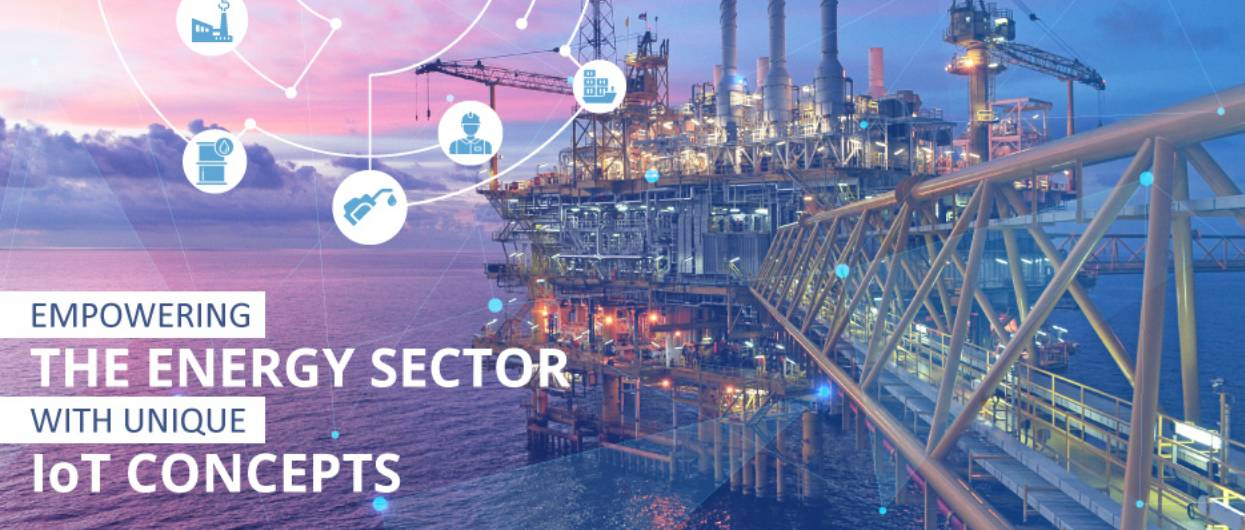
The Internet of Things has become a necessity in today’s times due to its rich features and technical attributes to make our lives simpler and more valuable. IoT is a measurable concept that is advancing the industries by introducing intelligent solutions.
In the energy sector, it has become a mandatory aspect to conserve energy for a sustainable future. With the introduction of the Internet of Things in the energy sector, smarter methods have been introduced like smart grids, intelligent appliances, cloud technology, etc.
The Internet of Things in the energy market has been valued at $15.04 billion in 2019 and is expected to grow at a CAGR of 17.24% by 2025, reaching $39.09 billion.
These numbers predict a significant impact of IoT on the energy industry in the coming years. So, let’s find out the specialty of IoT and its contribution to the energy sector.
Unique IoT Concepts for Energy Industry
-
Smart Grids
Management of the electric grids is now easier with the commencement of the Internet of Things technology.
Smart grids are made as a platform to carry out operations with the help of big data and information and communication technologies, which work better than the traditional grids.
These smart grids help improve energy efficiency, supply secured power, reduce the need for backup supply and other costs.
IoT technology can be significantly applied for isolated or microgrids located in distant islands or industries. It is very useful, especially where consistent energy is required without any exceptions like data centers.
In such cases, the interconnected assets can access the on-demand energy data, proving a perfect energy distribution management from anywhere and anytime. An IoT-based smart grid alerts the operators on their smart dashboards or gadgets much before any issue arises.
Though a smart grid constantly monitors the energy, it also easily detects if the energy demands are exceeding the grid capacity. The continuous real-time data collection facilitates the authorities to adopt different strategies for better energy consumption.
Also read: Top 10 IT Skills in Demand for 2021
Moreover, applying IoT with smart grids reduces transmission losses through real-time voltage management.
-
Smart Buildings
Energy consumption in the cities constitutes both residential and commercial services. Among which HVAC (heating, ventilation, and air conditioning) accounts for the maximum energy consumption in the buildings.
Therefore, it becomes critical to manage these maximum energy utilization areas. Here, IoT devices play a crucial role to curb excess energy losses.
You can install wireless thermostats on the desired places to realize the occupancies. These devices would automatically detect the unoccupied zones to significantly reduce energy wastage.
Especially, for HVAC systems, sensor-enabled thermostats are quite effective to eliminate extra energy consumption.
It is a status quo to use IoT technology and sensor devices to control home appliances in the current times. This significantly helps in managing energy losses due to unnecessary switched on lighting systems.
The IoT-enabled electrical appliances help the customers to stay alert when the energy consumption goes beyond a certain limit.
Also, a smart electrical infrastructure provides an efficient analysis of real-time data, which shifts the load from high-peak levels to lower ones automatically.
This makes IoT a perfect asset for optimal energy consumption as well as reducing the greenhouse emissions. IoT technology is thus allowing the demand responses to be agile and flexible along with efficient monitoring on the management side.
Also read: Best Oculus Quest 2 Accessories To Bring Home In 2024
-
Smart Transportation
The overuse of private vehicles leads to one of the major causes of air pollution and energy losses. More the number of vehicles, more fuel is required and more is the emission of greenhouse gases.
IoTizing the vehicles by installing sensors can be accepted as a major global management system. The technology helps collect real-time data and process it further to curb traffic and eliminate the vehicle idle time.
With the use of IoT, all the components of transportation can be interconnected and processed together for better results. This data-driven approach allows citizens to manage their schedules more efficiently by determining their arrival time.
It lessens the city trip timing of the vehicle and reduces unnecessary energy losses. Using the Internet of Things concepts with our transports envisions a more sustainable future with reduced energy consumption, curbing energy losses, and eliminating excess greenhouse emissions.
Apart from all these unique IoT concepts, you can also utilize IoT in industries for effective energy consumption monitoring.
Though industries comprise huge facilities and big machines, they must install effective monitoring techniques to stay alert.
An IoT-powered energy monitoring solution can be one of those systems that facilitate immense benefits for your plants and refineries. Here is a brief of its features.
Plug and Play Solution for Energy Monitoring
Monitoring the exact amount of energy consumed by the machinery is very beneficial to stay updated with the requirements at every step in an industrial process.
It also plays an important role to check the efficiency of your plant’s equipment. It thus improves the energy consumption patterns of every machine in the industrial facility.
The energy monitoring solution is embedded with sensors and other IoT devices to keep a real-time check on the energy utilization by each asset.
Here are multiple applications of an energy monitoring solution that you can integrate within your business.
- Real-time Monitoring
- Efficiency Improvement
- Microgrid for Optimum Power Consumption
- Digital Twinning
It is an effective way to automatically retrieve data and analyze it further to create power quality events.
This solution utilizes the capabilities of sensor devices and extracts real-time information from your plant to reflect useful data points for better decisions.
It also facilitates the creation of microgrids that are convenient for energy supplies in local regions. It helps in reducing the overall energy load on the main grid to meet the needs of consumers.
There are immense applications of an energy monitoring solution both commercially and industrially. IoT plays a significant role to satiate the overall demands in the energy sector with its unique concepts and ideas.
It is now easier to gain real-time insights on every activity of a machine or an electrical appliance, which further improves their functioning by transparently showing their performance.
IoT is thus empowering the energy industry in the most innovative ways and increasing the profits for the industrialists.
Top 10 News
-
01
10 Top-Rated AI Hugging Video Generator (Turn Images Into Ki...
Monday December 23, 2024
-
02
10 Top-Rated Face Swap AI Tools (Swap Photo & Video Ins...
Friday December 20, 2024
-
03
10 Exciting iPhone 16 Features You Can Try Right Now
Tuesday November 19, 2024
-
04
10 Best Anatomy Apps For Physiologist Beginners
Tuesday November 12, 2024
-
05
Top 10 Websites And Apps Like Thumbtack
Tuesday November 5, 2024
-
06
Top 10 Sites Like Omegle That Offer Random Video Chat
Monday October 21, 2024
-
07
Entrepreneurial Ideas To Make 5K In A Month (10 Realistic Wa...
Monday October 7, 2024
-
08
[10 Best] Cash Advance Apps Like Moneylion And Dave (No Cred...
Friday September 20, 2024
-
09
Top 10 Richest Person In The World
Tuesday August 27, 2024
-
10
Top 10 Unicorn Startups In The World (2024-25)
Monday August 26, 2024





